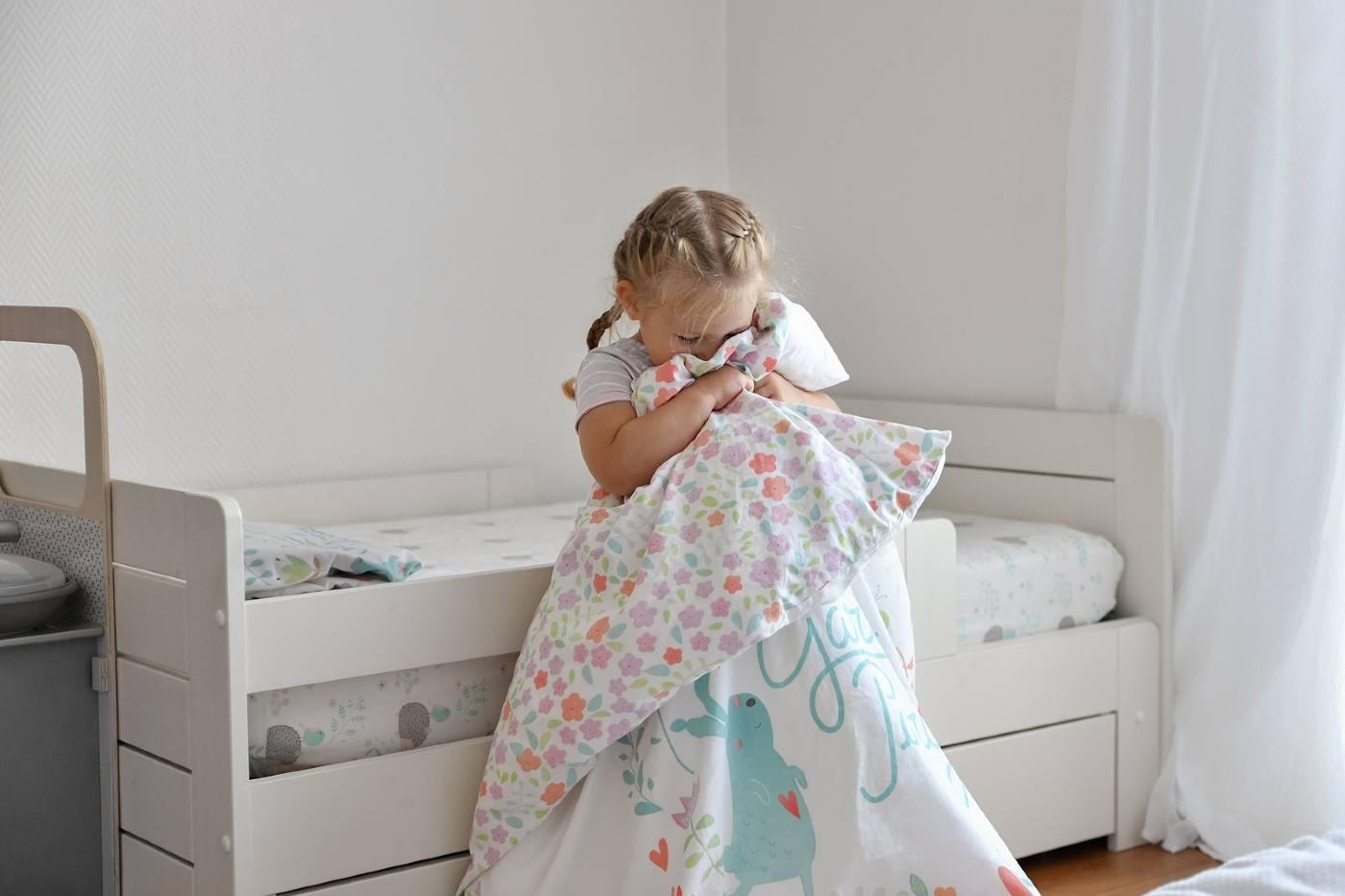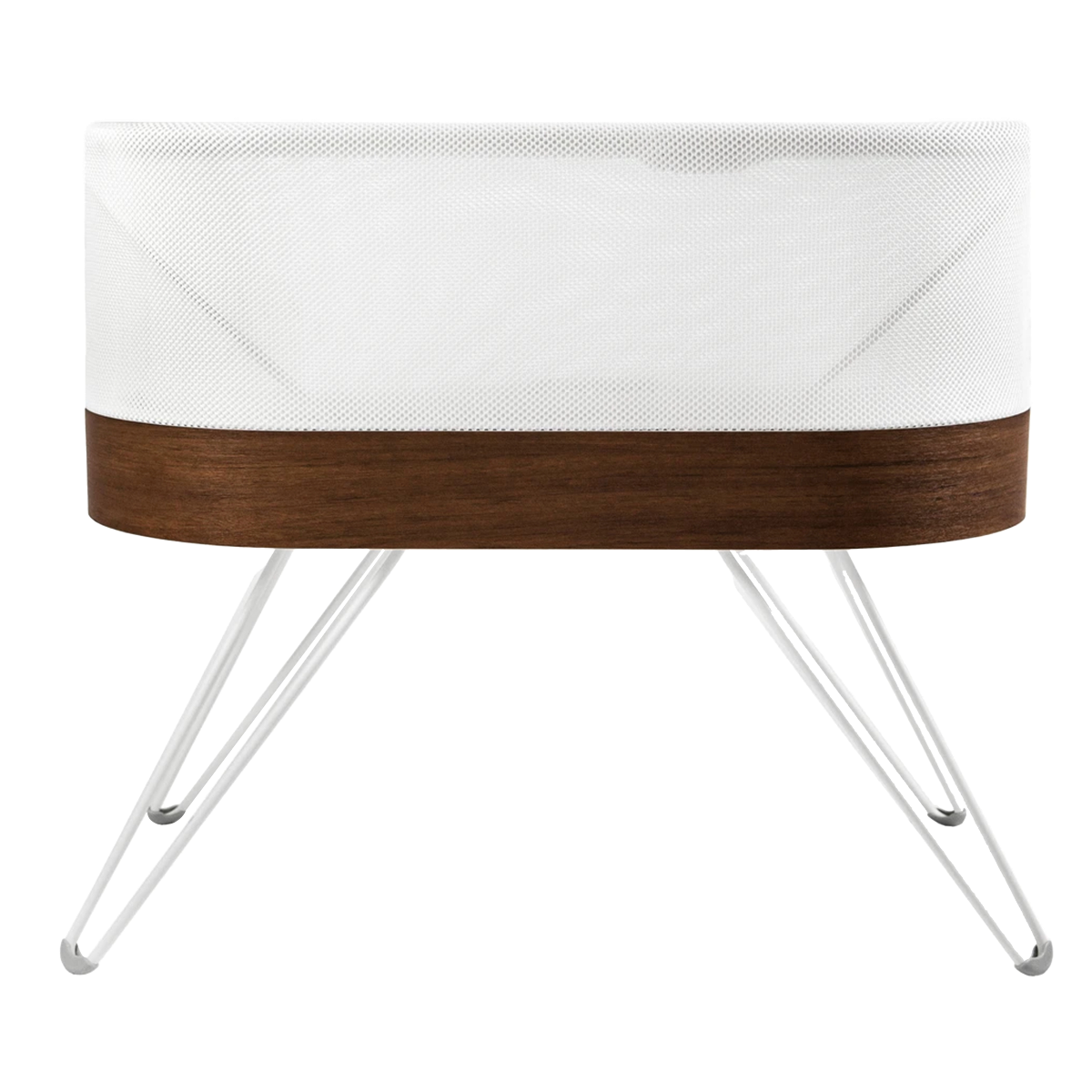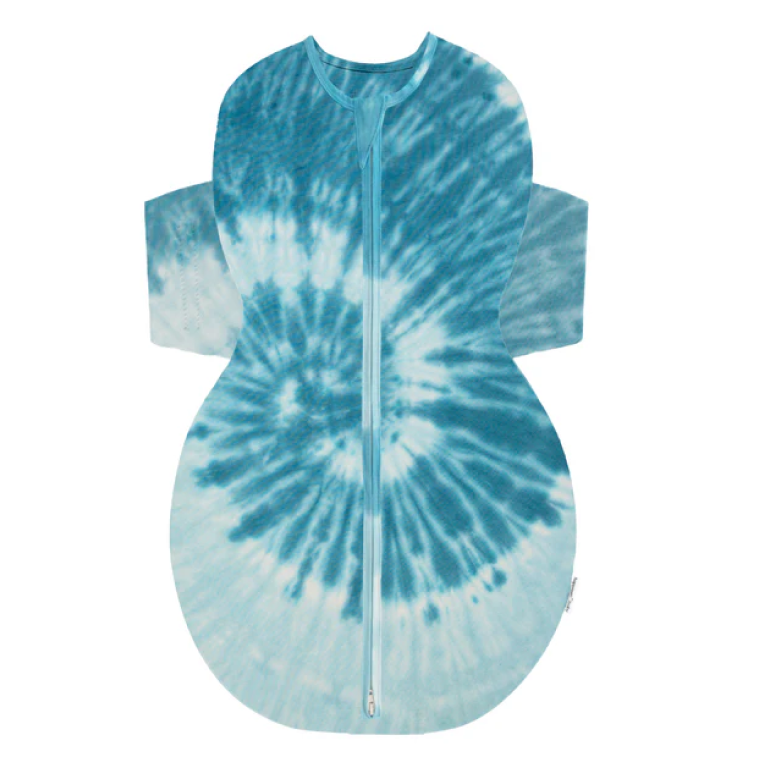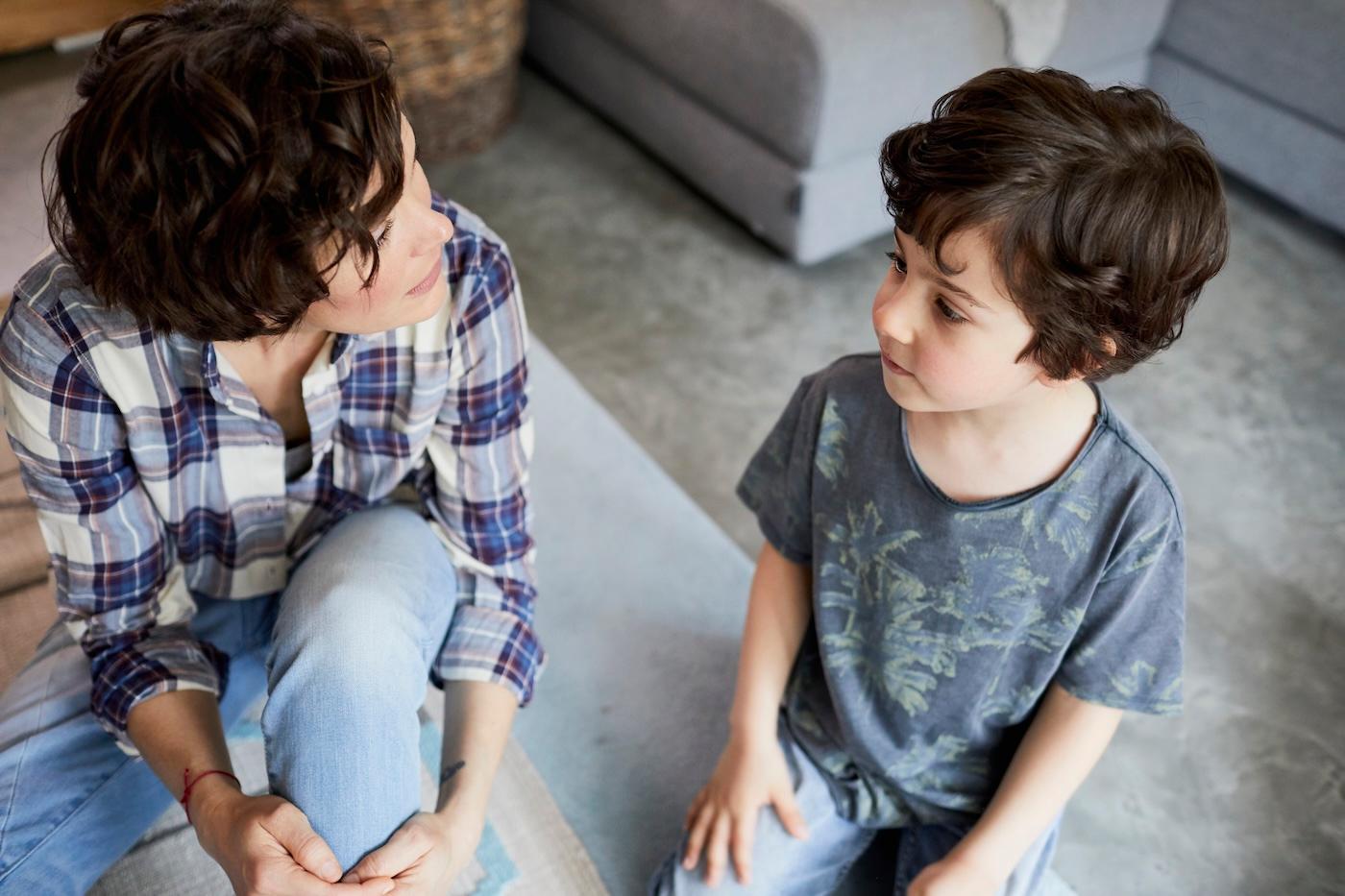TODDLER
Why Does My Potty-Trained Tot Still Wet the Bed?
Once you know why your kiddo is wetting the bed, the better your chances of helping them stop.

Written by
Happiest Baby Staff

Potty training realness: Although most children are toilet trained between 2 and 4 years old, lots of kids aren’t able to stay dry overnight for a few more years. In fact, research shows that up to 20% of children continue to wet the bed by age of 5. While bedwetting before 7 is not necessarily a medical concern, it’s no-doubt still concerning to parents and children, too. For more info on why your potty-trained tot is wetting the bed—and what to do about it—keep reading.
How common is bedwetting?
About 10% of children in the U.S. have nocturnal enuresis, which is doctor-speak for wetting the bed. And according to the American Academy of Pediatrics (AAP), most children wet the bed during potty training…even after they’ve managed to have dry nights for weeks. (That’s because the ability to control nighttime wetting develops later.) The roughly 20% of children who have nighttime accidents at age 5 or older are split into two categories:
-
Primary bedwetting: This is when children over the age of 5 have not experienced dry nights for six consecutive months. This is the most common type of bedwetting amongst children. - Secondary bedwetting: Here, children who’ve achieved at least six consecutive months of dry nights, begin to wet the bed. About one quarter of children who wet the bed experience secondary bedwetting.
Is bedwetting genetic?
Bedwetting is strongly related to family history, according to experts at UNC School of Medicine. In fact, the American Urological Association notes that a child without a family connection to bedwetting has only a 15% chance of wetting the bed. Half of all children who wet the bed have a parent who also struggled with bedwetting. And up to 75% of children who have nighttime accidents have two parents who struggled with bedwetting.
Do kids outgrow bedwetting?
A lot of children outgrow bedwetting. According to the AAP, only half of children who wet the bed at age 5 are still wetting the bed at age 7. And by the teen years, it’s estimated that only about 1 to 3% of kids still experience nighttime accidents.
What causes bedwetting?
Most of the time, nighttime accidents are not a sign of any larger medical or emotional issue. Instead, bedwetting is often simply a natural part of development. Once your tot matures enough, the nerves in their bladder wall will send a message to their brain saying “Hey, I’m full!” Then your child’s brain will send a message right back to their bladder to say, “Hold it!” until they’re awake and ready to get to the bathroom. Until then, here are some developmental reasons your tyke may wet the bed:
-
Small bladder. Your child’s bladder may not be developed enough to hold all the urine their body produces overnight. (A child who frequently pees a small amount throughout the day may have a small bladder.) - Nerve development. If the nerves that control your bub’s bladder are slow to mature, a full bladder may not wake your child up, especially if they’re a deep sleeper.
- Sleep arousal issues. When your kiddo is a deep sleeper, their brain doesn’t receive the signal to wake up when their bladder is full. (This brain-bladder control develops with time.)
- Underdeveloped circadian rhythms. Normally, antidiuretic hormones (ADH) are secreted at night to signal the body to create less urine. But when children’s circadian rhythms are underdeveloped, the nighttime rise in ADH doesn’t occur and, as a result, there can be an overproduction of nighttime urine. (This is called nocturnal polyuria.)
Does constipation cause bedwetting?
It can…particularly in children age 5 to 12 years old, found a 2020 study. And that’s why treating constipation is often the first step to treating bedwetting, according to the AAP. Constipation can lead to bedwetting in two different ways. First, the bladder and bowels are nestled close to each other, which means when a child is constipated, their backed-up bowels can push on their bladder, causing unintentional wetting. At the same time, the muscles used to control poop are the same that control pee. So, when constipation is chronic, these muscles can weaken and contribute to bedwetting. The good news? Treating constipation may alleviate your kiddo’s bedwetting issues. To help your child go, amp up their daytime water intake, incorporate more fiber-filled foods into their diet, and talk with your child’s pediatrician or urologist. They might prescribe a laxative to help “clean out” the backed up stool and keep your child more regular. (Learn the top foods to help your tot poop, according to a registered dietitian.)
Sleep Issues That Can Cause Bedwetting
It’s no surprise that wetting the bed is associated with sleep disturbances in children. After all, night accidents generally go hand in hand with night waking. In fact, a 2020 report in the Italian Journal of Pediatrics found that almost 76% of kids who wet the bed also report poor quality of sleep. But sleep issues themselves can also lead to bedwetting. According to Nationwide Children’s Hospital, children whose sleep is disturbed by snoring, screens, or pets—and children who are deep sleepers—are more likely to wet the bed. Some details:
-
Sleep apnea: It’s thought that up to 3% of children have obstructive sleep apnea (OSA). Among kiddos who regularly snore, that percentage bumps to as high as 10 to 20%. With OSA, a child’s poor breathing can cause the heart to produce the hormone atrial natriuretic peptide (ANP), which causes the kidneys to produce extra urine at night. (The most common treatment for OSA is a tonsillectomy or adenoidectomy, which’ll open up the airway.) - Sleep arousal issues: Here your tot’s brain isn’t getting the “wake up” signal when their bladder is full. Sometimes the message isn’t received even after they’ve had an accident. However, this “skill” will develop naturally over time—or it can speed up with treatment.
- Sleepwalking: Sleepwalking is more common in boys and is often linked to bedwetting. While sleepwalking is a tough behavior to curb, taking longer naps and an earlier bedtime may help. Also, avoid giving your child chocolate or other stimulants, including antihistamines and decongestants. (Learn more about sleepwalking from Dr. Harvey Karp.)
- Overtiredness: Research shows that sleep deprivation can greatly increase nighttime urination and possible bedwetting in otherwise healthy preadolescents. Because bedwetting is more likely to occur when your child is overtired, shoot for an earlier bedtime, complete with about an hour of relaxing downtime, with dim lights and white noise. (Find out more about Dr. Karp’s go-to bedtime routine.)
Medical Issues That Can Cause Bedwetting
Frequent or recurring bedwetting may be a sign that something more concerning is going on with your kiddo. Besides constipation and sleep apnea, mentioned above, here are some common underlying medical conditions that may cause bedwetting:
-
ADHD: Children with ADHD are about three times as likely to experience bedwetting than their peers. While the reasons are yet to be fully understood, it’s thought that both issues are linked to a delay in central nervous system development. (Learn more about ADHD and sleep.) - Diabetes: For a child who’s usually dry at night, bedwetting may be the first sign of type 1 diabetes. Other symptoms include peeing a lot at once, increased thirst, fatigue, and weight loss despite having a good appetite.
- Neurological or urinary system defect: Rarely bedwetting is related to structural issues with the urinary tract or nervous system.
- Urinary tract infection: A UTI can make it difficult for your kiddo to control their pee during the day and while sleeping. Signs include frequent and painful urination and red or pink urine.
Other Issues That Can Cause Bedwetting
Any form of stress may bring about nighttime accidents for your child. Bedwetting related to stressors often comes about after a child has been dry overnight for more than six months. Some common social stresses that can affect bedwetting, include:
-
Accident or trauma - Arrival of a new sibling
- Divorce or separation
- Family crisis
- Sleeping alone
- Starting school
When to Talk to the Doctor About Bedwetting
If your child has been completely potty trained for 6 months or longer—with no nighttime accidents—and suddenly begins to wet the bed, it’s a good idea to reach out to your child’s healthcare provider. Seemingly out-of-nowhere accidents may be a sign of an underlying medical issue or a traumatic event. That said, most medical problems that swiftly cause kids to wet the bed have other signs, too, such as:
-
Blood in undies - Changes in daytime peeing volume and habits
- Cloudy or pink urine
- Continuous dampness
- Daytime wetting and poop accidents
- Gait issues
- Pain, burning, or straining while peeing
- Peeing after coughing, running, or lifting
- Sudden personality or mood shifts
- Weak or dribbling urine stream
Final Thoughts on Why Kids Wet the Bed
No matter how frustrated you may get due to your child’s bedwetting, it’s incredibly important to remember that children do not wet the bed on purpose. They are not being lazy or willful. And, although bedwetting usually isn’t a serious medical condition, wetting the bed can cause great distress and embarrassment to your kiddo. In fact, they might start avoiding activities like sleepover parties and sleepaway camp because they’re worried, they might have an accident while away from home.
For help talking to your child about bedwetting—and for tips to quell nighttime accidents—check out our guide to managing bedwetting. And consider making your accident clean-up routine less stressful for all by using a water-resistant, 100% washable toddler mattress. Also, place a washable or disposable waterproof bed mat on top of your sheet and always have spare sheets at the ready. And, if need be, go ahead and offer your child an overnight pull-up diaper or absorbent underpants.
You may also be interested in…
- Potty Training Books for Toddlers
- How to Potty Train at Night
- Dr. Harvey Karp’s Guide to Getting Your Tot Ready for Potty Training
- Snoring in Children: Causes & Cures
- What to Know About Kids’ Bellyaches
***
REFERENCES
- American Academy of Pediatrics (AAP): Bedwetting: 3 Common Reasons & What Families Can Do
- Primary Nocturnal Enuresis: A Review. Nephro-Urology Monthly. July 2016
- Mayo Clinic: Bed-Wetting
- Cleveland Clinic: Bedwetting
- American Urological Association, Urology Care Foundation: Bedwetting to Potty Training—What You Need to Know
- National Kidney Foundation: Secondary Nocturnal Enuresis
- UNC School of Medicine, Urology: Daytime Wetness, Nighttime Bedwetting, and Constipation
- American Urological Association, Urology Care Foundation: Nocturnal Enuresis (Bedwetting)
- AAP: Bedwetting in Children & Teens: Nocturnal Enuresis
- The Nemours Foundation, KidsHealth: Bedwetting
- The Nemours Foundation, KidsHealth: Bedwetting (Nocturnal Enuresis)
- UC Davis Health, Children's Hospital: Bedwetting solutions: Expert pediatrician offers help for kids
- Bed-Wetting: Approaches to Nocturnal Enuresis in Children. S. Pharmacist. May 2017
- Association between constipation and childhood nocturnal enuresis in Taiwan: a population-based matched case-control study. BMC Pediatrics. January 2020
- Epidemiology of enuresis: a large number of children at risk of low regard. Italian Journal of Pediatrics. September 2020
- Nationwide Children’s: Bedwetting: 5 Common Reasons Why Children Wet the Bed
- Yale Medicine: Pediatric Obstructive Sleep Apnea
- Sleep deprivation induces excess diuresis and natriuresis in healthy children. American Journal of Physiology-Renal Physiology. January 2012
- Understood: Is there a link between ADHD and bedwetting?
Disclaimer: The information on our site is NOT medical advice for any specific person or condition. It is only meant as general information. If you have any medical questions and concerns about your child or yourself, please contact your health provider.
SHARE THIS ARTICLE
MOST LOVED
Sleepytime Sidekicks












